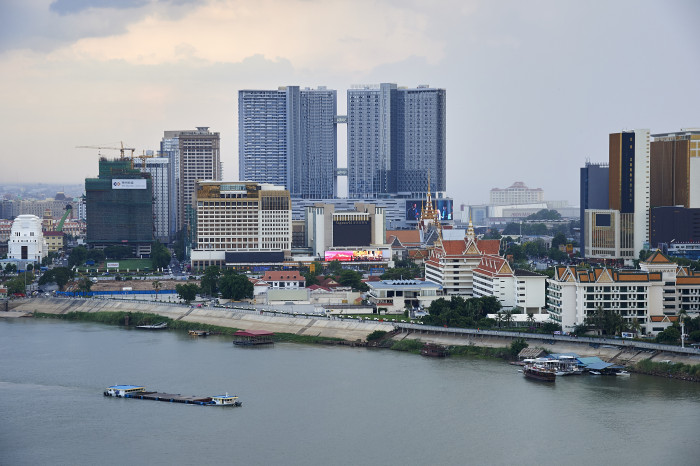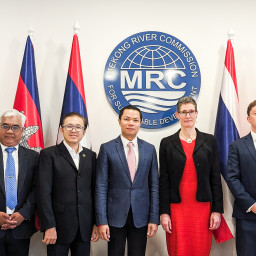New strategy to address Mekong wide challenges near finishing line
Vientiane, Lao PDR, 12 June 2020 – A draft Mekong basin development strategy to respond to critical environmental and social pressures from ongoing and planned developments and climate change in the Mekong River Basin has now received a greenlight from a governance body of the Mekong River Commission, according to a special meeting of the MRC.
Over the last decade, the Mekong River has come under increasing threat from climate change, water resources development projects such as hydropower dams, irrigation projects, sand mining, and increased populations, the challenges both the MRC’s State of the Basin Report 2018 (SOBR) and Council Study have pointed out.

A ferry is seen transporting sand along the confluence of the Mekong, Tonlé Sap, and Bassac Rivers in Phnom Penh, commonly called Chaktomuk.
Cambodia, Lao PDR, Thailand and Viet Nam and stakeholders have called for a more proactive regional approach to basin planning and management to optimise economic benefits while continuing to protect the Mekong’s rich natural resources and people’s livelihoods.
The endorsement ad-referendum of a 10-year Basin Development Strategy (BDS) by the MRC Joint Committee at its Special Session, organised in Vientiane on June 4 through teleconferencing, is a prompt response to this call. This will pave the way for a final consideration and approval by the MRC’s higher governance body, the Council of ministers, and for the MRC and all relevant actors to begin implementation timely next year.
“Our new Strategy takes a more focused whole-of-basin approach to guide all actors involved in Mekong water-related issues towards achieving improvements in the environmental, social and economic state of the Mekong River Basin, with benefits to all basin countries and peoples,” Dr An Pich Hatda, the MRC Secretariat Chief Executive Officer, said at the Meeting.
The new BDS uses the SOBR to identify key issues faced by basin countries in developing and managing the water and related resources and sets out the way in which the countries agree to jointly address these issues in order to promote the sustainable development of the basin in-line with the aims and intent of the 1995 Mekong Agreement.
It also uses feedback and recommendations from regional and national stakeholders gathered during public consultations as well as written submissions from reviewers of various drafts.
The BDS sets five strategic priorities to respond to demanding challenges facing the basin; these include maintaining the ecological function of the Mekong River Basin, enabling inclusive access and utilisation of the basin’s water and related resources, improving optimal and sustainable development of water and related sectors, strengthening resilience against disasters, and boosting cooperation among all basin countries and stakeholders.
Among key outputs to be delivered in the next ten years by all relevant actors in their cooperation are diverse but within the aim of protecting the river and livelihoods, as developments accelerate and climate change intensifies.
These deliverables will include maintenance of acceptable flows and water quality that cover tackling plastic waste, putting in place a basin-wide sediment management plan, and ensuring there are effective fish passes. They will be extended to include improved flood and drought forecasting and communication with the public, and cooperation and coordination mechanisms for data and information sharing on water infrastructure and related water emergencies.
Measures to address gender and vulnerability issues, and proposals for joint investment projects that consider more storage in the basin, assess alternative energy/water system integration options, and develop core river monitoring networks and compatible decision support systems are also in the strategy.
The draft strategy notes that its effective and successful execution will hinge upon involvement by all relevant actors to plan and act together for a common interest of the basin.
The MRC will implement the BDS through its five-year Strategic Plan in coordination with relevant Mekong actors involving in water resources development. The Strategic Plan tackles both medium- and long-term needs and challenges for the Mekong basin identified in the BDS – the needs and challenges that no one riparian country can tackle effectively alone.
Read this news in Lao.
###





